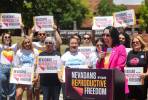Nevada fires back in Education Savings Account lawsuit
Nevada is sparing no expense in fighting an American Civil Liberties Union of Nevada lawsuit that seeks to unravel the Education Savings Account program.
ESAs allow the parents of public school students to take public funds and use them for any educational purpose, such as tutoring, books or tuition at a private school. The ACLU contends, however, that allowing state funds to be spent at religious schools violates the Nevada Constitution.
Attorney General Adam Laxalt hired former Solicitor General of the United States Paul D. Clement to assist in Nevada's defense, and this week, the state moved to dismiss the case. Among its arguments:
No harm, no foul. The state claims ESAs don't violate the constitutional prohibition on state funds being used "for sectarian purpose."
"The ESA program serves educational purposes, not sectarian ones," the brief reads. "To the extent that ESA funds find their way to religious schools, they do so only through a series of private, individual decisions by the families and students who take part in the program, just as if a state worker uses her paycheck to pay for tuition at such schools, or if that state worker uses her state-provided health savings account to pay for medical services at a religiously affiliated private hospital."
Both are bad analogies: A worker's wages become his or her private property when a paycheck is delivered, and there's no language in the constitution prohibiting the use of government money at religious hospitals. There is such a prohibition on the sectarian use of education funds, and with good reason.
Also, ESA funds are unquestionably state, not private, money. They can only be used for certain state-authorized expenditures, and if an ESA contract is terminated, the money reverts to the state. Parents choose where the money is spent, but when they do, they're acting as agents of the state.
Public versus private. But lawyers for the state call ESA funds private. They write, "this court should avoid an interpretation of [the ESA law] that would treat the use of private funds by individual participants in the program for an educational purpose as an expenditure of public funds for a sectarian purpose." (emphasis in original)
But that's precisely what is happening, and whether by direct state action or a parent's choice, the use of government money for sectarian purpose is prohibited.
The constitution doesn't really mean what it says. Nevada's lawyers try to parse the constitution to suggest the provision in question doesn't really bar the use of public funds at religious schools. "Nothing in the intent behind [Article 11] Section 10 ... suggests that Section 10 broadly bars funding that in some remote or incidental way benefits a religious institution when its purpose is clearly secular."
Actually, the entirety of Section 10 clearly and unambiguously bars funding for sectarian schools: "No public funds of any kind of character whatever, State, County or Municipal, shall be used for sectarian purpose."
The provision at issue is anti-Catholic. The state contends that Section 10 was enacted in 1880 to punish Catholics and their schools, noting that Protestant instruction continued in public schools even after its enactment. Nevada contends the state should avoid having to confront that ugly history by interpreting the section to allow ESAs.
But ignoring the constitution is no solution; Section 10 is either constitutional or it's not, and its the job of the courts to determine which. There are very good reasons to prohibit taxpayer money from flowing to religious schools, and those prohibitions act to protect the schools as well as the state.
—Steve Sebelius is a Las Vegas Review-Journal political columnist and co-host of the show "PoliticsNOW," airing 5:30 p.m. Sundays on 8NewsNow. Follow him on Twitter (@SteveSebelius) or reach him at 702-387-5276 or ssebelius@reviewjournal.com.




























